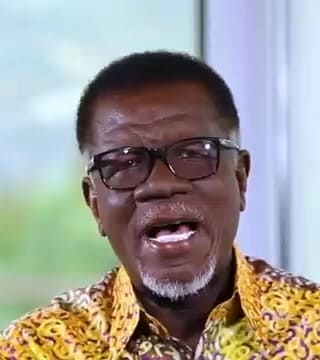Mensa Otabil - The Voice of Doubt (11/02/2025)
Welcome to a brand new week, and this week we are going back to the story of Moses. We’re going to track his calling and how he responds to God. So, we will be in Exodus chapter 4 throughout the week, and as we normally do, we will go verse by verse.
Exodus 4:1: Then Moses answered and said, «But suppose they will not believe me or listen to my voice? Suppose they say, 'The Lord has not appeared to you.'» I like the way he uses the word «suppose.» He’s imagining the worst-case scenario. Moses had an extraordinary encounter with God, a kind of encounter that we all hope to have with Him. We think if we ever had such an encounter with God, all our doubts and fears would be wiped away. But it tells you, you may have such an encounter with God and still be doubtful about what He wants to do with your life.
Moses saw a burning bush without being consumed; he heard the voice of God. God introduced Himself to Moses and said, «I am that I am.» All these were magnificent supernatural encounters, but they didn’t drown out the voice of doubt in his heart. It’s something we all experience: we may have a deep assurance from God and be very sure about what we must do, but at the same time be unsettling about whether we can do it and whether we have what it takes.
Moses wanted to know whether God had a backup plan for him: «What if it doesn’t work? What if I go to tell them that you’ve sent me and they say, 'No, no, no, God didn’t send you? ' Is there a plan B? Is there a backup plan? Lord, what do you have for me?» Because anytime God impresses on our hearts to do something great, we are going to hear a voice of negativity. Sometimes it comes from people outside us, but most of the time, it comes from within us, and it often originates from our past. It is the voice of our past-our past failures running after us.
Moses failed in Egypt and ran to Midian. Forty years have passed, but the voice of failure was still there; it was still speaking to him, still demoralizing him. Now he has this supernatural encounter. It should be sufficient for him to know that it’s going to be okay, but the voice of doubt is strong. One of the things you have to know is that self-doubt can be a very, very strong voice. Self -doubt can sometimes be positive because it helps us not to be overconfident, but many times it just diminishes us and paralyzes us. For Moses, it wasn’t helping him to become better; it was about to destroy the supernatural relationship he had with God.
Do you ever go through situations like that? Where in your heart you know you can do something great, but the voice of your past failures comes back to you? It could be how you failed academically, how you failed in a relationship, or how you failed in business. But something about your past tells you you are disqualified and you can’t do it, even though everything about your present tells you that you have what it takes to do it. That is where Moses was, and we see this throughout the Scriptures. When God raised people to do something for Him, they almost always had to come up with some excuse as to why they thought it would be very difficult for them to obey God.
If you are doubting whether God can use you, I trust that this week you will find that God, who knows your past, also knows your future. When He sends you, He doesn’t send you to your past; He sends you to your future, and He believes you have what it takes to do the assignment He has called you to do. So, we are going to be like Moses; we may ask questions, and God will give us the answers.
Let’s pray. Say with me: Heavenly Father, Your Word is my sure foundation. Help me to trust You even when I don’t trust myself. In Jesus' name, amen and amen.

